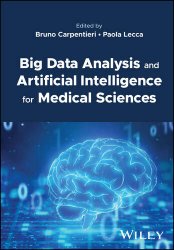Big Data Analysis and Artificial Intelligence for Medical Sciences
- Добавил: literator
- Дата: 13-06-2024, 16:45
- Комментариев: 0
 Название: Big Data Analysis and Artificial Intelligence for Medical Sciences
Название: Big Data Analysis and Artificial Intelligence for Medical SciencesАвтор: Bruno Carpentieri, Paola Lecca
Издательство: Wiley
Год: 2024
Страниц: 433
Язык: английский
Формат: pdf (true), epub
Размер: 33.7 MB
Overview of the current state of the art on the use of Artificial Intelligence (AI) in medicine and biology.
Big Data Analysis and Artificial Intelligence for Medical Sciences demonstrates the efforts made in the fields of Computational Biology and medical sciences to design and implement robust, accurate, and efficient computer algorithms for modeling the behavior of complex biological systems much faster than using traditional modeling approaches based solely on theory.
Several scientific disciplines, such as computer vision and image recognition, self-driving cars, natural language processing, website recommendations, solid-state materials science, finance, bioinformatics, and chemistry, to name a few, have adopted machine learning algorithms in the past decade or so. Thanks to their general applicability to different applications, data-driven models are computationally attractive for use in the medical sciences and the healthcare industry, where they are becoming increasingly popular.
Advances in AI research have led to the development of more sophisticated algorithms that function similarly to the human brain and have helped address some of these challenges and opened up new possibilities for AI applications. ML has evolved into a field known as deep learning (DL), which consists of techniques for creating and training artificial neural networks (ANNs) with multiple layers of interconnected nodes, also known as neurons, capable of learning and making decisions independently, similar to the human brain. These neural networks are inspired by the structure and operation of biological neural networks in the human brain, although they do not completely replicate the human brain's complexities and mechanisms. By iteratively adjusting the weights and biases of the interconnected neurons, DL algorithms are able to recognize complex patterns, extract meaningful representations from large amounts of raw data, and make decisions or predictions across multiple domains. This has produced extraordinary progress in numerous fields, including computer vision, NLP, speech recognition, and medical sciences.
With chapters written by international experts in the field of medical and biological research, Big Data Analysis and Artificial Intelligence for Medical Sciences includes information on:
- Studies conducted by the authors which are the result of years of interdisciplinary collaborations with clinicians, computer scientists, mathematicians, and engineers
- Differences between traditional computational approaches to data processing (those of mathematical biology) versus the experiment-data-theory-model-validation cycle
- Existing approaches to the use of big data in the healthcare industry, such as through IBM's Watson Oncology, Microsoft's Hanover, and Google's DeepMind
- Difficulties in the field that have arisen as a result of technological changes, and potential future directions these changes may take
A timely and up-to-date resource on the integration of artificial intelligence in medicine and biology, Big Data Analysis and Artificial Intelligence for Medical Sciences is of great benefit not only to professional scholars, but also MSc or PhD program students eager to explore advancement in the field.
Contents:
Скачать Big Data Analysis and Artificial Intelligence for Medical Sciences
[related-news] [/related-news]
Внимание
Уважаемый посетитель, Вы зашли на сайт как незарегистрированный пользователь.
Мы рекомендуем Вам зарегистрироваться либо войти на сайт под своим именем.
Уважаемый посетитель, Вы зашли на сайт как незарегистрированный пользователь.
Мы рекомендуем Вам зарегистрироваться либо войти на сайт под своим именем.

